Gairdner Symposium, UBC 2019: Ronald Vale and Bruce Stillman
Monday, October 21, 3:30-6:00 pm
Life Sciences Centre, LSC #2
2350 Health Sciences Mall, UBC
Posted on September 12, 2019
Gairdner Symposium, UBC 2019: Ronald Vale and Bruce Stillman
Monday, October 21, 3:30-6:00 pm
Life Sciences Centre, LSC #2
2350 Health Sciences Mall, UBC
Hosted by Dr. Michael Hayden, Centre of Molecular Medicine and Therapeutics, UBC
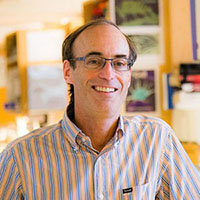
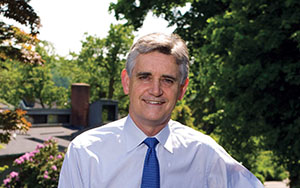 Dr. Bruce Stillman
Dr. Bruce StillmanPosted on September 12, 2019
 “New approaches for addressing the effect of genetic variation at scale,” by Douglas M. Fowler, Associate Professor, Department of Gnome Sciences, University of Washington, School of Medicine.
“New approaches for addressing the effect of genetic variation at scale,” by Douglas M. Fowler, Associate Professor, Department of Gnome Sciences, University of Washington, School of Medicine.
How does a protein’s sequence encode its fold and function? How do changes in sequence influence disease risk, prognosis and treatment? How do gene expression patterns combine with protein activity to define cellular processes like growth, migration and communication? The Fowler lab is interested in developing new ways to probe the relationship between genotype and phenotype, enabling us to better answer these questions. In particular, we have applied large-scale mutagenesis to reveal a new mechanism of kinase regulation, to better understand the meaning of variants in human genomes, and to better predict the impact of mutations.
Monday, October 7, 1019, at 2:30 pm, LSC #3
Hosted: by Christian Kastrup
Posted on August 30, 2019
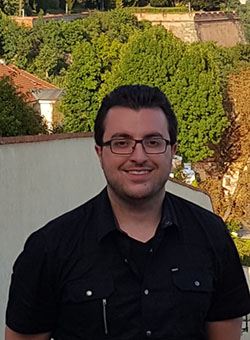 “Human-yeast cross-species complementation of chromosome instability genes”, by Akil Hamza, doctoral candidate, Hieter Lab.
“Human-yeast cross-species complementation of chromosome instability genes”, by Akil Hamza, doctoral candidate, Hieter Lab.
Thursday, October 3, 2019 at 12:30 in Room 200, Graduate Student Centre, 6371 Crescent Road.
Abstract
Humanized yeast offer a valuable resource with which to model and study human biology. Using cross-species complementation, model organisms like the budding yeast, Saccharomyces cerevisiae, can be utilized to measure the impact of tumor-specific mutations and screen for genetic vulnerabilities of genes overexpressed in cancer. To this end, we performed three parallel screens, one-to-one complementation screens for essential and nonessential yeast genes implicated in chromosome instability (CIN) and a pool-to-pool screen that queried all possible essential yeast genes for rescue of lethality by all possible human homologs. Our work identified 65 human cDNAs that can replace the null allele of essential yeast genes, including the nonorthologous pair yRFT1/hSEC61A1. For the nonessential yeast genes, 20 human-yeast complementation pairs were determined to be replaceable in 44 assays that test rescue of chemical sensitivity and/or CIN defects. For five human-yeast complementation pairs expressing human cDNAs encoding hLIG1, hSSRP1, hPPP1CA, hPPP1CC and hPPP2R1A, we introduced 45 tumor-specific missense mutations and assayed for growth defects and sensitivity to DNA-damaging agents in yeast. This set of human-yeast gene complementation pairs allows human genetic variants to be readily characterized in yeast, generating a prioritized list of somatic mutations that could contribute to chromosome instability in human tumors. We also selected a human-yeast pair expressing hFEN1, which is frequently overexpressed in cancer and is an anti-cancer therapeutic target, to perform synthetic dosage lethal (SDL) screens using ectopic overexpression of wild-type and catalytically inactive hFEN1 in yeast. The SDL screens identified homologous recombination (HR) repair mutants as synthetic lethal with overexpression of catalytically-inactive hFen1. The SDL interactions were dependent on binding of hFen1 to DNA suggesting that toxicity was a result of catalytically inactive hFen1 becoming trapped on DNA and resulting in DNA damage. Our study establishes the utility of using cross-species complementation and ectopic overexpression to generate human-yeast genetic interaction networks and to model protein-inhibitor interactions using genetic approaches. Overall, these data establish the utility of this cross-species experimental approach.
Posted on August 23, 2019
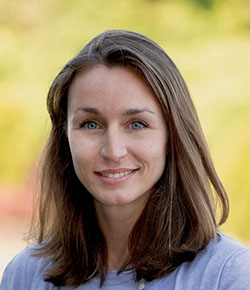 “Physical Perturbations to the Gut Microbiota During Health and Disease,” by Carolina Tropini, PhD, Assistant Professor, School of Biomedical Engineering and Department of Microbiology & Immunology, UBC.
“Physical Perturbations to the Gut Microbiota During Health and Disease,” by Carolina Tropini, PhD, Assistant Professor, School of Biomedical Engineering and Department of Microbiology & Immunology, UBC.
The consortium of microbes living in and on our bodies is intimately connected with human biology and deeply influenced by physical forces. Despite incredible gains in describing this community, and emerging knowledge of the mechanisms linking it to human health, understanding the basic physical properties and responses of this ecosystem has been comparatively neglected. Most diseases have significant physical effects on the gut; diarrhea alters osmolality, fever and cancer increase temperature, and bowel diseases affect pH. Furthermore, the gut itself is comprised of localized niches that differ significantly in their physical environment, and are inhabited by different commensal microbes. Understanding the impact of common physical factors is necessary for engineering robust microbiota members and communities; however, our knowledge of how they affect the gut ecosystem is poor.
We are investigating how changes in osmolality affect the host and the microbial community and lead to mechanical shifts in the cellular environment. Osmotic perturbation is extremely prevalent in humans, caused by the use of laxatives, lactose intolerance, or celiac disease. In our studies we monitored osmotic shock to the microbiota using a comprehensive and novel approach, which combined in vivo experiments to imaging, physical measurements, computational analysis and highly controlled microfluidic experiments. By bridging several disciplines, we developed a mechanistic understanding of the processes involved in osmotic diarrhea, linking single-cell biophysical changes to large-scale community dynamics. Our results indicate that physical perturbations can profoundly and permanently change the competitive and ecological landscape of the gut, and affect the cell wall of bacteria differentially, depending on their mechanical characteristics.
Monday, September 9, 2019 at 2:30 pm, LSC#3
Host: Dr. Christian Kastrup
Posted on August 22, 2019
 “Differential transporter utilization facilitates nutrient crosstalk and creates a targetable metabolic niche in cancer,” by Seth Parke, Post-Doctoral Fellow, New York University School of Medicine, Alec Kimmelman Lab.
“Differential transporter utilization facilitates nutrient crosstalk and creates a targetable metabolic niche in cancer,” by Seth Parke, Post-Doctoral Fellow, New York University School of Medicine, Alec Kimmelman Lab.
Department of Biochemistry and Molecular Biology and BC Children’s Hospital presents Seth Parker, candidate for joint Faculty position in BMB and BCCHRI.
Seth Parker received his B.S. in Chemical and Biological Engineering from the University of Colorado at Boulder. He completed his Ph.D. in Bioengineering at the University of California, San Diego where he developed quantitative methods to study cancer metabolism under the supervision of Dr. Christian Metallo. He is currently a postdoctoral fellow at New York University School of Medicine in the laboratory of Dr. Alec Kimmelman where he studies alanine transport in pancreatic cancer. He is interested in understanding how specific transporters permit acquisition of nutrients from the tumor microenvironment, and how targeting these transporters may restrict tumor growth by limiting access to anabolic substrates.
Friday, September 6th at 9:00 am
Michael Smith Laboratories, Lecture Theatre, Room 102
2185 East Mall
Posted on August 22, 2019
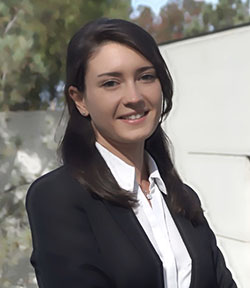 “Charting metabolism in health and disease by activity metabolomics and nanostructure imaging mass spectrometry,” by Amelia Palermo, post-doctoral scientist.
“Charting metabolism in health and disease by activity metabolomics and nanostructure imaging mass spectrometry,” by Amelia Palermo, post-doctoral scientist.
Department of Biochemistry and Molecular Biology and BC Children’s Hospital presents Amelia Palermo, candidate for joint Faculty position in BMB and BCCHRI. Amelia is currently a post-doctoral scientist at The Scripps Research Institute Center for Metabolomics in San Diego, working in the group of Professor Gary Siuzdak. Her research interests focus on the characterization of the metabolic determinants of resistant cancer phenotypes by activity metabolomics and on the development of novel mass spectrometry-based approaches for metabolomic sand systems biology.
Wednesday, September 4th at 9:30 am
Michael Smith Laboratories, Lecture Theatre, Room 102
2185 East Mall
Posted on August 22, 2019
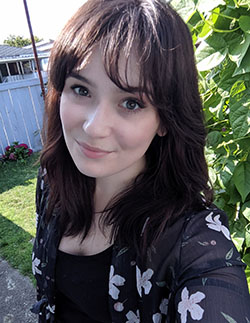 Congratulations Jennifer! On August 1st, 2019 Jennifer Nagel successfully defended her thesis, “Exploring the role of chemotherapy induced anastasis in triple negative breast cancer.” Jennifer have been training in Shoukat Dedhar Lab at the BC Cancer Agency.
Congratulations Jennifer! On August 1st, 2019 Jennifer Nagel successfully defended her thesis, “Exploring the role of chemotherapy induced anastasis in triple negative breast cancer.” Jennifer have been training in Shoukat Dedhar Lab at the BC Cancer Agency.
Posted on July 30, 2019
 “Small Molecules Effective for Disruption of HIV-1 Latency“, by Seyedeh Pargol Hashemi, PhD candidate in Sadowski Lab.
“Small Molecules Effective for Disruption of HIV-1 Latency“, by Seyedeh Pargol Hashemi, PhD candidate in Sadowski Lab.
Tuesday, August 20, 2019 at 9:00 am, Room 203, Graduate Student Centre, 6371 Crescent Road.
Abstract
Although antiretroviral therapies have improved the outlook of the HIV epidemic by controlling virus replication, they do not provide a cure. The major barrier to development of a cure lies in the virus’s ability to become transcriptionally silent as chromosomally integrated provirus. The presence of latently infected cells that harbor transcriptionally repressed viral genomes, predominately consisting of long-lived memory CD4+ T cells, gives rise to cellular reservoirs that are impenetrable by current therapies. Therefore, devising ways to selectively target these latent reservoirs is imperative for the long-term management of the disease. My thesis focuses on the shock phase of a proposed cure strategy known as “shock and kill,” which aims to induce latent HIV-1 reservoirs that could then be purged via a boosted immune response, specific targeting of infected cells, or by viral-induced apoptosis. To this end, I identified five novel small molecule compounds, of a class commonly referred to as latency reversing agents (LRAs), that are capable of reversing HIV latency without affecting the general T cell activation state. These compounds exhibit synergy for reactivation of latent provirus with other LRAs, in particular, ingenol-3-angelate. One compound, designated PH02, was efficient at reactivating viral transcription in several cell lines bearing HIV-1 reporters at different integration sites. Furthermore, this compound was capable of reversing latency in resting CD4+ T lymphocytes from patients on antiretroviral therapy, while producing minimal cellular toxicity. The combination of PH02 and ingenol-3-angelate produces a strong synergistic effect of reactivation, as demonstrated by a quantitative viral outgrowth assay on CD4+ T lymphocytes from HIV-1-infected individuals. A comparison of similar efforts from other groups is provided, with the goal of illustrating the diversity of molecular scaffolds that can produce HIV-1 latency reversing activity. I expect these results will contribute to a deeper understanding of mechanisms regulating HIV-1 latency but also will provide insight towards design of optimized structures for development of highly effective LRAs capable of forcing a purge of the persistent HIV-1 infection.
Posted on July 23, 2019
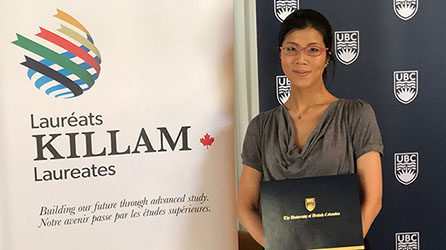 “Characterization of Interaction between Ty1 Integrase and RNA Polymerase III For Ty1 Retrotransposon Insertion Into the Yeast Genome“, by Stephanie Cheung, PhD candidate in the Measday Lab.
“Characterization of Interaction between Ty1 Integrase and RNA Polymerase III For Ty1 Retrotransposon Insertion Into the Yeast Genome“, by Stephanie Cheung, PhD candidate in the Measday Lab.
Thursday, August 15, 2019 at 12:30 in Room 203, Graduate Student Centre, 6371 Crescent Road.
Abstract
Retrotransposons are eukaryotic mobile genetic elements that transpose by reverse transcription of an RNA intermediate and are derived from retroviruses. The Ty1 retrotransposon of Saccharomyces cerevisiae (S. cerevisiae) belongs to the Ty1-copia superfamily. Ty1 integration into the S. cerevisiae genome occurs within a 1 kb window upstream of genes transcribed by RNA Polymerase (Pol) III, including tRNA genes, 5S rRNA genes, and other small non-coding RNA genes. A Ty1-encoded protein, integrase (IN), is needed for catalyzing the insertion of Ty1 cDNA into the genome. The functional domains of INs among retrotransposons and retroviruses are also strikingly similar although the host genome target site selection is different. We seek to identify the S. cerevisiae host factors that mediate the specificity of Ty1 integration target site selection. We find that Ty1-IN interacts in vivo and in vitro with Pol III-specific subunits using mass spectrometry and co-purification approaches. The interaction with Pol III is specific as Ty1-IN does not interact with Pol II or the transcription complexes that recruit Pol III to promoters. Next, we narrow down the region required for interaction with Pol III to the Ty1-IN C-terminal (Ct) 75 amino acids. Using a purified version of the Ty1-IN Ct we demonstrate using single-particle electron microscopy that Ty1-IN docks onto the RNA Pol III complex in a region that maps to the Pol III jaw and clamp domains. We test a panel of Pol III subunit mutant strains for Ty1 integration, and find mutations in the Rpc34, Rpc53 and Rpc160 Pol III subunits that abrogate Ty1 insertion upstream of tGLY genes. We also optimize a whole genome Ty1 mapping protocol and analyze de novo Ty1 integration sites in a subset of these Pol III mutant strains. We find that rpc34 mutants are less efficient at targeting the Ty1 element upstream of all tRNA genes whereas an rpc53 mutant has no effect. Taken together, we establish that RNA Pol III is the host factor that tethers the Ty1 intasome to insertion target sites at Pol III-transcribed genes.
Posted on April 25, 2019
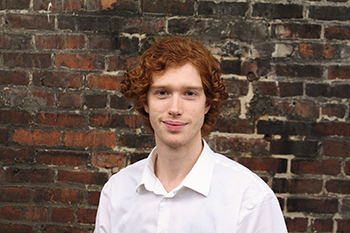 “Moonlighting tRNA synthetases as extracellular targets of matrix metalloproteinases, ” by Parker Jobin, MD/PhD Candidate, Overall Lab.
“Moonlighting tRNA synthetases as extracellular targets of matrix metalloproteinases, ” by Parker Jobin, MD/PhD Candidate, Overall Lab.
Wednesday, May 22, 2019 at 9:00 am in Room 200 of the Graduate Student Centre, 6371 Crescent Road.